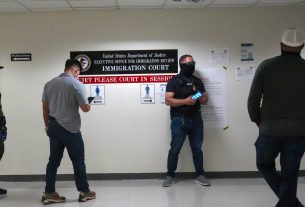(JTA) — A Republican-led commission tasked with studying antisemitism in Virginia recommended a suite of actions, from improving Holocaust education to prohibiting Israel boycotts, while also referring to former President Donald Trump’s recent dinner with a pair of prominent antisemitic figures.
The Virginia Commission to Combat Antisemitism, established by Gov. Glenn Youngkin, a Republican, also concluded in a report released earlier this week that “political advocacy in the classroom has been associated with subsequent antisemitic actions.”
The report, which Youngkin ordered on his first day in office in January, comes just weeks after the U.S. Department of Education opened an investigation into allegations of antisemitic harassment at a Fairfax County school district, filed by the right-wing Zionist Organization of America. Congress has since 2004 mandated an annual report on antisemitism worldwide, and a number of states have commissions on how best to advance Holocaust education and broader anti-hate measures.
In Virginia, the state that hosted the deadly 2017 Charlottesville march that thrust right-wing white nationalism into the American consciousness, the forming of such a commission to fight antisemitism was a potential model for other states to follow. While the report does touch on Charlottesville, it lays as much blame for antisemitism on anti-Israel activists and the state education system as it does on white nationalists.
Mirroring Youngkin’s own language about what he refers to as liberal bias in public schools, the report encouraged Virginia’s legislature to pass laws “prohibiting partisan political or ideological indoctrination in classrooms and curricula at state-supported K-12 schools and higher education institutions.”
Jennifer Goss, the program manager for the Holocaust education group Echoes & Reflections who was on the commission’s education subcommittee, said those recommendations were born out of “some members of the commission feeling concern over reported instances of antisemitism of educators, particularly in higher education institutions, making comments related to the concurrent political situation in Israel.”
For examples of such instances of anti-Israel bias among college educators, the report cited a study from the conservative Heritage Foundation alleging that university administrators tweet more negative comments about Israel than about “oppressive regimes”; its other examples involved reports of antisemitism and anti-Israel activity among university students.
By making the topic a cornerstone of his successful gubernatorial campaign and current legislative priorities, Youngkin helped turn Virginia into a hotbed for Republican-led claims that public schools are indoctrinating students with “critical race theory,” an academic concept that analyzes different aspects of society through the lens of race and ethnicity. Legislative attempts to curb such classroom instruction nationwide have sparked controversy, including in the realm of Holocaust education; school officials and lawmakers have argued students should learn about the Holocaust from the Nazis’ perspective, and multiple incidents have resulted in schools briefly or permanently removing Holocaust books from their shelves.
Democratic Virginia legislators criticized the report for what they saw as leaning into one of Youngkin’s pet issues. “You can count on him to go to the lowest common denominator and then try to politicize our children’s classrooms,” the state’s House Minority Leader, Don Scott Jr., told The Washington Post.
The commission was chaired by Jeffrey Rosen, who is Jewish and served as the acting U.S. Attorney General in the final month of the Trump administration; his work as chair was highly praised by commissioners who spoke to JTA. The commission’s other members, all appointed by Youngkin, included representatives from B’nai B’rith International, local law enforcement and non-Jewish organizations such as defense contractor Vanguard Research Inc.
Without mentioning Trump by name, the report included the passage, “Even a former president recently met with two notorious antisemites,” referring to Trump’s recent Mar-a-Lago dinner with rapper Kanye West and Nick Fuentes, whom the ADL deems a white supremacist.
Trump’s name was not mentioned because “we didn’t want it to be partisan,” said Bruce Hoffman, director of Georgetown University’s Center for Jewish Civilization and a member of the commission.
The report largely cited data from the Anti-Defamation League and the FBI’s hate crimes division when discussing antisemitism, but it also cited the Louis D. Brandeis Center for Human Rights Under Law, a pro-Israel legal group that frequently files challenges against U.S. universities. The AMCHA Initiative — which launches campaigns against supporters of the Israel boycott movement in higher education — along with prominent pro-Israel attorney and frequent Trump ally Alan Dershowitz are also quoted in the report, in sections on the rise of antisemitism on college campuses.
The report echoed some Brandeis Center language that some criticized as inflammatory, including its chair’s claims that the University of California-Berkeley had instituted “Jew-free zones” after some law students adopted a bylaw boycotting Zionist guest speakers.
The commission recommended that Virginia create a law prohibiting the state from doing business with entities that boycott Israel, similar to laws in several other states. It also recommended that Youngkin use an executive order banning “academic boycotts of foreign countries,” without specifying which countries.
The commission did not mention Youngkin’s own brushes with antisemitism controversies, including his 2021 assertion that Jewish Democratic megadonor George Soros was secretly inserting liberal operatives into the state’s school boards. His political action committee also financially supported a Republican state House candidate who in an ad depicted his Jewish opponent with a digitally enlarged nose, surrounded by gold coins.
“Hatred, intolerance, and antisemitism have no place in Virginia and I appreciate the committee’s hard work to highlight and grapple with these matters,” Youngkin said Monday in a statement.
Sam Asher, director of the Virginia Holocaust Museum in Richmond, said his main contribution as a member of the commission was to push for the state to adopt the International Holocaust Remembrance Alliance’s definition of antisemitism, which other states and countries have done. He also pushed for more Holocaust education across the state, and both of those recommendations made the final report.
“I think it’s a very good report,” he said. “Now we need to put things into legislation.”
The executive director of the Jewish Community Relations Council of Greater Washington told The Washington Post that he was generally “thrilled” by the report, but he added that he wants local Jewish leaders to get time to digest its recommendations.
“I would hope that the governor and legislative leaders would not take steps on any of these things until they’ve consulted with the people who it’s going to have the most impact on,” Ron Halber said.




